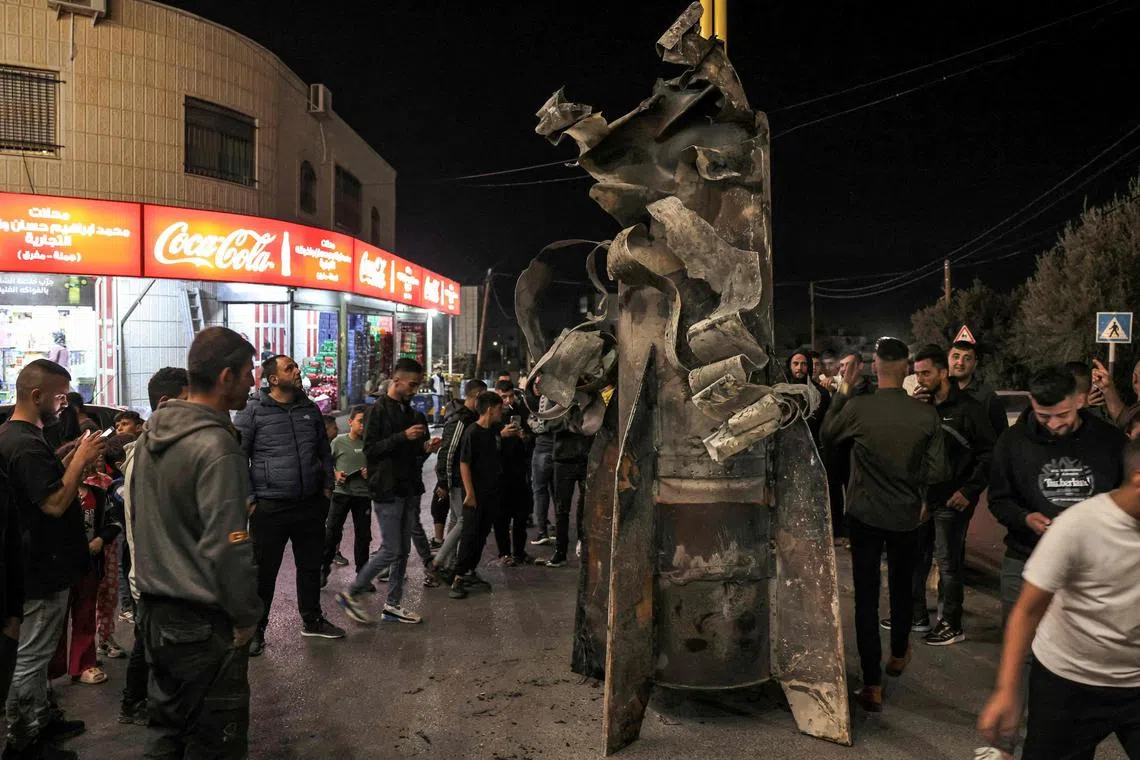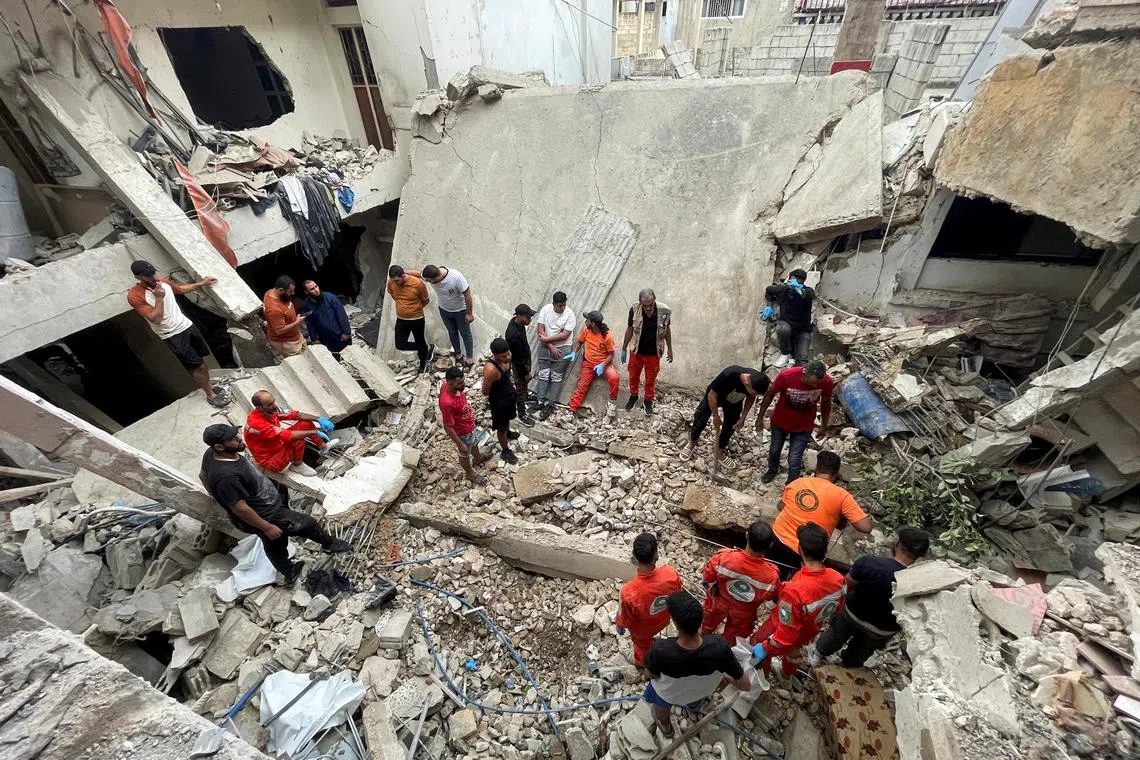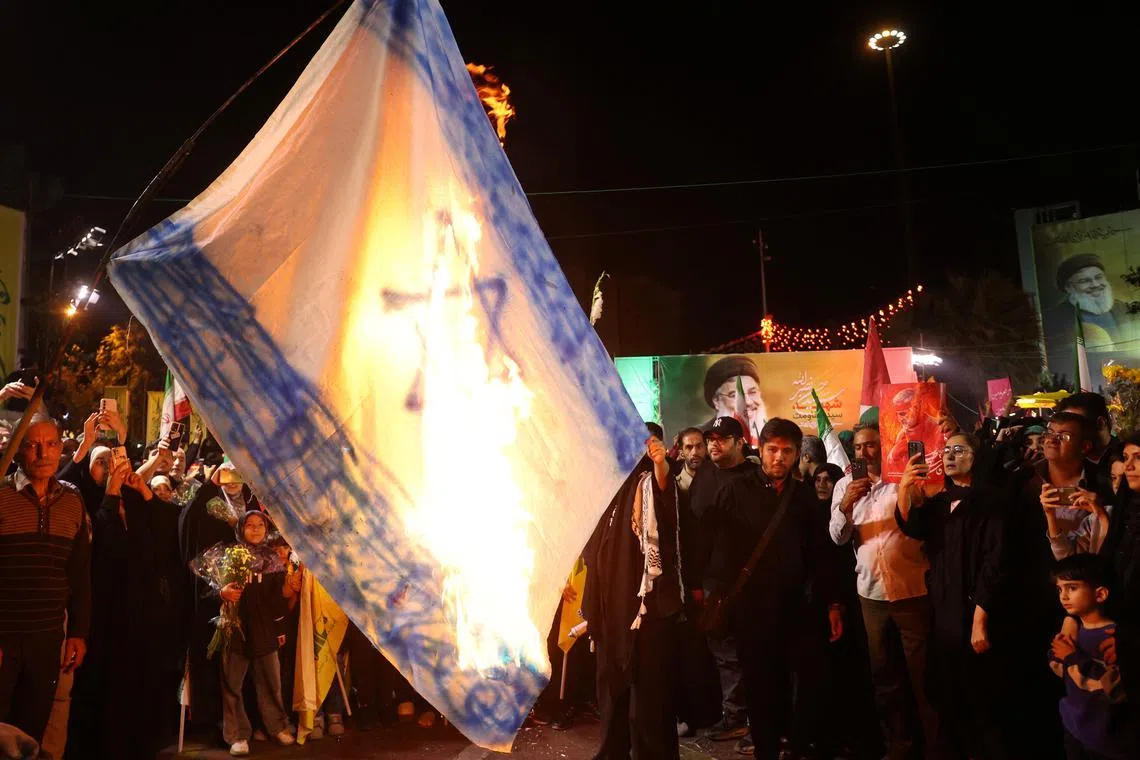‘Whoever attacks us, we attack them’: Israel PM Netanyahu vows response to Iran’s missile attack
Sign up now: Get ST's newsletters delivered to your inbox
Follow topic:
JERUSALEM/BEIRUT – Israeli Prime Minister Benjamin Netanyahu promised that arch-foe Iran would pay for its missile attack against Israel on Oct 1,
“Iran made a big mistake tonight and will pay for it,” he said hours after the attack, and warned: “Whoever attacks us, we attack them.”
In a separate statement, Israel Defence Minister Yoav Gallant, who was at the command and control centre monitoring the interception of Iranian missiles, also vowed to punish Iran for the attack.
“Iran has not learnt a simple lesson: Those who attack the state of Israel pay a heavy price,” he said in a statement issued by his office.
US Secretary of Defense Lloyd Austin said he spoke with Mr Gallant following Iran’s “outrageous act of aggression” against Israel.
“The minister and I expressed mutual appreciation for the coordinated defence of Israel against nearly 200 ballistic missiles launched by Iran and committed to remain in close contact,” Mr Austin said in a post on X on Oct 1.
As Washington expressed full backing for long-time ally Israel, Iran’s armed forces said direct intervention by Israel’s supporters against Tehran would provoke a “strong attack” from Iran on their “bases and interests” in the region.
Iran’s Foreign Minister said that its missile attack on Israel was finished
“Our action is concluded, unless the Israeli regime decides to invite further retaliation. In that scenario, our response will be stronger and more powerful,” Iranian Foreign Minister Abbas Araqchi said in a post on X early on Oct 2.
He said Iran’s action against Israel came after exercising tremendous restraint to give space for a ceasefire in Gaza.
Iran’s chief of staff also vowed to hit infrastructure across Israel if its territory is attacked.
The barrage “will be repeated with bigger intensity and all infrastructure of the regime will be targeted”, Major-General Mohammad Bagheri said on state TV on Oct 2.
Oil prices shot up 5 per cent on fears of a wider war between the two archenemies, and the UN Security Council scheduled a meeting on the Middle East for Oct 2.
Iran’s Revolutionary Guard Corps said the assault was in retaliation for Israeli killings of militant leaders and aggression in Lebanon against the Iran-backed armed movement Hezbollah and in Gaza.
Fears that Iran and the US would be drawn into a regional war have risen with Israel’s intensifying assault on Lebanon in the past two weeks, including the start of a ground operation there on Sept 30, and its year-old conflict in the Gaza Strip.
In its attack on Oct 1, Iran fired more than 180 ballistic missiles at Israel, Israel said. Alarms sounded across Israel and explosions could be heard in Jerusalem and the Jordan River valley. Israelis piled into bomb shelters and reporters on state television lay flat on the ground during live broadcasts.
Iran’s forces used hypersonic Fattah missiles for the first time, and 90 per cent of the missiles successfully hit their targets in Israel, the Revolutionary Guards said.
Israeli air defences were activated and most missiles were intercepted “by Israel and a defensive coalition led by the United States”, Israeli Rear-Admiral Daniel Hagari said in a video on X, adding: “Iran’s attack is a severe and dangerous escalation.”
Central Israel received “a small number” of hits, and there were other strikes in southern Israel, he said. The Israeli military published video footage of a school in the central city of Gadera that was heavily damaged by an Iranian missile.
No injuries were reported in Israel, but one man was killed in the occupied West Bank, the authorities there said.
US Navy warships fired about a dozen interceptors against Iranian missiles headed towards Israel, the Pentagon said.
US President Joe Biden expressed full US support for Israel and described Iran’s attack as “ineffective”. He said there was an active discussion about how Israel would respond, and he would confer with Mr Netanyahu.

People gathering around a fallen projectile that was moved to the centre of a square in the Palestinian village of Dura west of Hebron in the occupied West Bank, on Oct 1.
PHOTO: AFP
Vice-President Kamala Harris, the Democratic candidate for US president, backed Mr Biden’s stance and said the US would not hesitate to defend its interests against Iran.
Israel vowed consequences for the onslaught.
“We will act. Iran will soon feel the consequences of their actions. The response will be painful,” Israel’s UN Ambassador Danny Danon told reporters.
The White House similarly promised “severe consequences” for Iran and spokesman Jake Sullivan told a Washington briefing the US would “work with Israel to make that the case”.
Mr Sullivan did not specify what those consequences might be, but he stopped short of urging restraint by Israel as the US did in April when Iran carried out a drone and missile attack on Israel. The Pentagon said Oct 1’s air strikes were about twice the size of April’s assault.
Any Israeli response to Oct 1’s missile attack would be met with “vast destruction” of Israeli infrastructure, Iran’s General Staff of the Armed Forces said in a statement carried by state media, also promising to target regional assets of any Israeli ally that got involved.
Iran’s Foreign Ministry said its operation was defensive and directed only at Israeli military and security facilities. Earlier, Iran’s state news agency said Tehran targeted three Israeli military bases. Iran urged UN Security Council action.
UN Secretary-General Antonio Guterres condemned what he called “escalation after escalation”, saying: “This must stop. We absolutely need a ceasefire.”
EU foreign policy chief Josep Borrell also called for an immediate regional ceasefire. “The dangerous cycle of attacks and retaliation risks... spiralling out of control,” he posted on X.
Escalation in Lebanon

The site of an Israeli strike that hit a building in Ain al-Hilweh refugee camp and targeted Mounir Maqdah, commander of the Al-Aqsa Martyrs Brigade, near the southern city of Sidon, Lebanon, on Oct 1.
PHOTO: REUTERS
Iran had vowed to retaliate following Israeli strikes that killed the top leadership of its ally Hezbollah in Lebanon, including the group’s leader Hassan Nasrallah,
Hamas, the Iran-backed militant group in Gaza, praised the Iranian missile strikes, saying they avenged Israeli assassinations of three militant leaders, including Nasrallah.
Palestinians in the Gaza Strip, locked in nearly a year of war, celebrated as they watched dozens of rockets en route to Israel. Some of those rockets fell in the Palestinian enclave after being intercepted by Israel but caused no deaths, witnesses said.
In Beirut, Israeli strikes killed the commander of the Imam Hussein division, Israel’s military said, referring to a Hezbollah-linked group based in Syria.

Iranians burning an Israeli flag during a celebration after Iran’s Revolutionary Guard Corps’ attack on Israel, in Tehran, Iran, on Oct 1.
PHOTO: REUTERS
Lebanon’s Health Ministry said 55 were killed and 156 wounded in Israeli attacks on Oct 1.
Israel said overnight that its troops had launched ground raids into Lebanon,
Nearly 1,900 people have been killed and more than 9,000 wounded in Lebanon in almost a year of cross-border fighting, most in the past two weeks, according to Lebanese government statistics released on Oct 1.
But a ground campaign into Lebanon for the first time in 18 years pitting Israeli soldiers against Hezbollah, Iran’s best-armed proxy force in the Middle East, would be a major regional escalation. REUTERS, AFP

